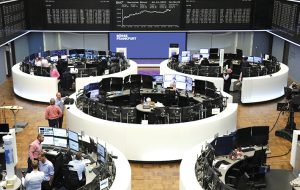BLOOMBERG
European stocks slid, following a weak session in Asia after Federal Reserve officials pushed back against bets of aggressive interest rate cuts next year. The Stoxx Europe 600 index dropped 0.4%, while US stock futures edged higher. The MSCI Asia Pacific Index lost as much as 1.1%, the most since December 5. The dollar was broadly steady while yields on two-year Treasuries dropped two basis points, trimming gains made when New York Fed President John Williams led a chorus of officials in saying it’s too early to begin thinking about lowering borrowing costs.
The pushback may start to dim the ‘everything rally’ after traders took previous Fed signals as a green light to ratchet up bets on rate cuts next year, helping US shares to their biggest weekly gains in a month.
Central bankers from the US to Europe and Canada have already begun their battle with traders. Atlanta Fed President Raphael Bostic, who votes on monetary policy next year, told Reuters that he expects two rate cuts in 2024, but not starting until the third quarter. Separately, Chicago Fed President Austan Goolsbee said it’s an overstatement to consider rate cuts until officials are convinced inflation is on a path lower to its target. Bank of Canada Governor Tiff Macklem shared similar sentiment. “The US markets are going to need to get evidence that the Fed pushback from NY Fed Williams and Atlanta Fed Bostic is misplaced,” Bob Savage, head of markets strategy and insights at BNY Mellon Capital Markets, wrote in a note. “At the heart of the week ahead is the risk that financial conditions everywhere are easier and sparking more growth and inflation than forecast.”
In Europe, European Central Bank Governing Council Joachim Nagel said it’s too early to be considering rate cuts, while fellow member Madis Muller said that markets are getting ahead of themselves in betting on policy easing in the first half of next year. ECB President Christine Lagarde said the bank had not discussed rate cuts at all.
Now, attention shifts to Japan with the nation’s central bank beginning a two-day policy meeting. While speculation has grown the Bank of Japan will soon end the world’s last negative-rate regime, economists see April as the most likely timing for a change, with around 15% expecting Ueda to pull the plug on negative rates in January, according to a Bloomberg survey of more than 50 economists. “The BOJ has little need to rush into making policy changes,” Societe General economists led by Wei Yao wrote in a note. “But markets will be watching for any sign the board is willing to end negative rates or yield curve control.”
In commodities, gold edged higher while oil rose, extending last week’s rise as major shipping lines suspended transit through the Red Sea, following escalating attacks on merchant ships.
 The Gulf Time Newspaper One of the finest business newspapers in the UAE brought to you by our professional writers and editors.
The Gulf Time Newspaper One of the finest business newspapers in the UAE brought to you by our professional writers and editors.
